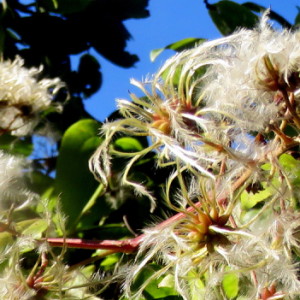Old man's beard, old woman's summer
Wild clematis provides its seeds with the sort of fluffy grey fuzz to be seen on the chin of King Lear (as superbly enacted by Ian McKellen in last week's live screening of the play.) I knew I would find it here, framing the view down to the old harbour.
A few days ago, nature writer Robert McFarlane challenged his Twitter followers to dig up alternative names for the 'Indian' summer we are enjoying at present. Surely this period of autumnal heat must have to referred to another way in pre-colonial times? Sure enough, the Welsh haf bach Mihangel (Michael's little summer) cropped up as well as St Martin's and St Luke's according to when the fine spell occurred, their name days being September 29th, October 18th and November 11th respectively.
There were other old names: badger summer in parts of Scandinavia. Yes, it's a busy time for badgers as they feed up and dig in for the winter Badgers don't hibernate as such but they need to build up their fat reserves for the lean times ahead.
But most of all, old woman's, or grandmother's summer emerged as the ur-name for a period of unseasonal autumnal warmth - in Eastern European and Slavic countries especially. Now that I could understand, as I basked in the afternoon sunshine. We dread the chilblains and frozen fingers, the slippery ground and dim days to come. But the name's not all negative. A warm autumn is good for fungi and it was old women who were the keepers of the specialised knowledge of where to look and what to pick. Traditionally, children would be sent to the forest with their old granny or nanny, depending to which social class they belonged, and return home with their mushroom baskets filled. Old women supervised the gathering of berries for syrups and cordials and it was they who held the pickle recipes for the last of the garden produce.
Now is the summer of our content, brief though it may be.
Extra: old man's beard close up


Comments
Sign in or get an account to comment.


